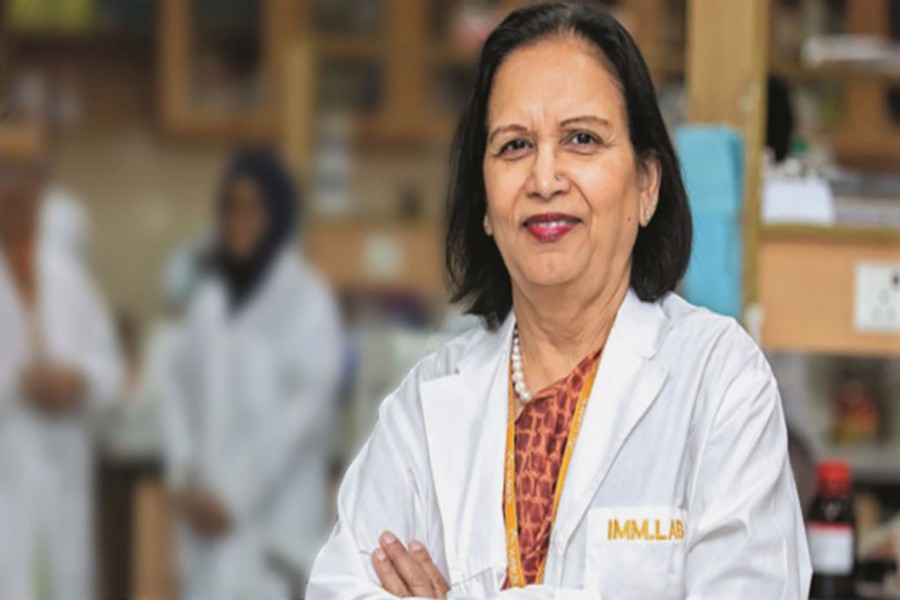A new disease may reach pandemic status at any time following the end of the COVID-19 crisis, warns Dr Firdausi Qadri.
The Ramon Magsaysay Award-winning scientist advised authorities to take precautionary measures to counter such a possibility, reports bvdnews24.com.
In an interview with the news agency, Qadri said though COVID-19 infections have dropped recently, a new variant of the disease may once again cause infection rates to soar.
“Today we have COVID-19. The threat will be something else in the future. We think a lot about emerging pathogens – Nipah and dengue. Changes are happening everywhere,” she said.
“Antimicrobial resistance is also deadly. No medications will work if a virus becomes resistant. If they do, even known diseases could reach pandemic levels. We have to stay alert about emerging and re-emerging diseases.
Qadri mentioned that the health sector structure which helped combat COVID-19 will be useful in the future.
“We had 4-5 RT-PCRs at the start, but now we have nearly a thousand. We are now working on biosafety-2. It cannot be denied that the pandemic made us aware of biohazard dangers. It is now our duty and the government’s responsibility to sustain the infrastructure and intellectual capacity we have developed. The media must also focus on the issue so it remains a part of the discussion.”
The coronavirus hit Bangladesh hardest in July-August this year, registering about 16,000 cases and 250 deaths in a 24-hour count. The peak positivity rate was 32 percent.
The surging infection rate has slowed down over the past few days, with only 685 cases were recorded on Friday with seven fatalities, the lowest in seven months. The current rate of infection has dropped to around 2.77 percent.
The icddr,b scientist feels the COVID-19 crisis has subsided by a significant margin, but fears that the evolving nature of the virus might give rise to a new crisis down the line.
“Infections had fallen before, but surged again with the arrival of the delta variant. We have to remember that another wave might be imminent, the variant may undergo changes.
“Everyone keeps asking me whether the potency of the virus has diminished. But I’m not prepared to say the virus’s capacity for harm has passed, or its potency has lowered to the endemic level. I am not yet convinced.”
Though Bangladesh is currently at a good stage in terms of vaccine management, Qadri said, but vaccines must be produced in the country to completely overcome the inoculation crisis.
“We did not know about COVID and did not properly understand how to vaccinate against it. But we’ve come a long way. We are now buying vaccines, bringing them in through COVAX, and also trying to develop them ourselves. If vaccines are not made domestically, we will always fall behind in acquiring a suitable number.”
“Most rich countries are keeping 70-80 per cent of the vaccines for themselves. They are reserving those for booster doses. They are wasting a lot of vaccines. There are usually differences between us, but it has become more pronounced in terms of vaccines. We would’ve received more vaccines if the developed countries shared more.”
EMPHASIS ON RESEARCH
Dr Qadri thinks a lack of funds for research and the need for more laboratories and research institutes are holding back Bangladesh.
“Bangladesh has funds for research, but it is limited. Good research cannot be carried out with such limited funds. We don’t have any research institutes here apart from icddr,b.”
Qadri said she always felt that more studies should be conducted in Bangladesh, and so she worked on cholera, vaccines, disease identification, typhoid, diarrhoea, nutrition and other topics with a strong connection to the country.
“It makes no sense to do research which will have no value in Bangladesh. We know about different infectious diseases in Bangladesh, such as cholera and diarrhoea. We were vaccinated for cholera in our childhood, but it was of little use. The typhoid vaccines weren’t that effective either. So, I felt we had to carry out research in Bangladesh that could help.”
On the day Dr Qadri received the Ramon Magsaysay Award for her instrumental work in the development of vaccines that have saved millions of lives, her husband was at death’s door.
For this reason, Dr Qadri says, she was unable to grasp its significance then. But she has since come to appreciate it.
“In truth, I was so worried and upset that I did not feel anything at that time. If I was asked to choose between the award and my husband’s wellbeing, I would obviously choose the latter.”
“But when I considered it later, I realised you all wanted to talk about my success. The respect that came with the award made me realise its significance. I’ve received many awards. I didn’t know this latest one outweighed the others, but I came to understand it later. I’m astonished at how they discovered my work and presented me with the honour.”
Dr Qadri wants to continue to work on health, congenital diseases and vaccines that can be used in Bangladesh for children and adults.
“And I also want to work on developing vaccines in Bangladesh and enrich the health sector with my work.”
A senior scientist at icddr,b, Dr Qadri received the Ramon Magsaysay Award earlier this year for her work in the fight against cholera and typhoid, which are major diseases in Bangladesh and across Asian and African countries that have limited access to safe water, sanitation, education and medical care.
The Ramon Magsaysay Award Foundation lauded “her untiring contributions to vaccine development, advanced biotechnological therapeutics and critical research that has been saving millions of precious lives”.


